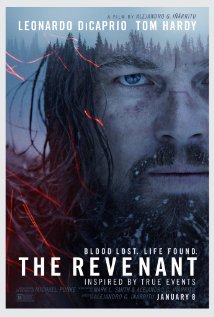Equally engrossing as exhausting, and beautiful as grotesque, The Revenant – the latest film by Alejandro G. Iñárritu and Emanuel Lubezki is all about the journey. The ultimate end-game is established after a cinema-graphically remarkable set-up. The end-game so-to-speak is known by the viewer and the lead characters for a good 100 of the film’s 156 minute run-time. A terrific aspect of a film such as The Revenant is that at some-point during the journey the viewer becomes a participant.
Normally a film 2.5 hours+ in length is at risk of losing its viewers. The Revenant however, is never at risk of such a fate. Why?
First, Lubezki (AA Birdman, AA Gravity) arguably the best Director of Photography in filmmaking today – has done it again. I could easily watch The Revenant in its entirety without having the pleasure of the dialogue from its script or musical soundtrack. In The Revenant, quality long-shots, pans, mid-shots, and closeups are part of the offering; many times in the same scene with superb effect.
Second, the screenplay is highly compelling. There are multiple storylines expertly interwoven throughout. Written by Iñárritu (AA Birdman, AAN Babel, 21 Grams) and Mark Smith, and taken from Michael Punke’s 2002 novel; The Revenant is based in part on the real-life fur trapper Hugh Glass.
Third, lead actors Leonardo DiCaprio as Glass, Tom Hardy as John Fitzgerald, Domhnall Gleeson as Captain Henry, and Will Poulter as Bridger deliver superb performances that quickly allow you to forget they are acting out a part in a film. And then there is Momma Bear. Momma Bear should get top billing!
Fourth, the musical soundtrack contains a mixture of themes – which are quite different – but work appropriately. Rare in films of today the musical score contains the works of two completely different composers; Ryuichi Sakamoto (AA The Last Emperor) and Carsten Nicolai.
What works to a lesser effect are some flashbacks for Glass. While from a story telling perspective, these flashbacks are important – the connections do not feel as nearly as genuine as other elements.
The Revenant ultimately works because it carefully develops the storyline and lets the set-up, journey, and the end-game take place without feeling rushed or compromised.
———
Notes and Other Worthless Trivia from Jeff
Lubezki has been nominated for an Oscar for The Revenant. If he wins it would be three years in a row. Wow! Personally, I think Lubezki should have taken the Oscar for two other films for which he was nominated; Little Princess (1996) and Children of Men (2007).
If It Is Tuesday This Must Be Argentina. Although the movie is set and shot in part in Montana (where Glass operated as a fur-trapper). Other locations were used as planned, and others unplanned out of necessity. Alberta and British Columbia were utilized as planned. However, shooting was moved to the White and San Francisco mountains of Arizona and then to Tierra del Fuego in Argentina. This is because of the loss of snow and early spring in the northern western hemisphere. This lack of consistency and continuity was noticeable to me. Normally, I am ticked off by things like this (e.g., Vancouver B.C. filling in as Seattle or Toronto as Washington D.C., or worse the foothills of Southern California as Kansas). In this case I went with the flow because the scenery was magnificent.
Do As I Say and You Can Do in Return. The Revenant has some remarkably demanding scenes for which having a stunt double perform in place of the actor is not feasible. Evidently, Thomas Hardy and Iñárritu were at odds over the requirement. Iñárritu made an agreement with Hardy that any act performed on Hardy during the filming, Hardy could then perform on Iñárritu after the shot was complete. Hardy took Iñárritu up on the offer.
Must Remain Quiet. Although the movie would not exist without Michael Punke and his novel, he cannot speak about the film or participate in its promotion. Why? Punke is currently the Ambassador to the World Trade Organization for the United States of America. Therefore as an employee of the federal government ethics rules do not allow Punke to promote the work and further enrich himself while on the payroll.
